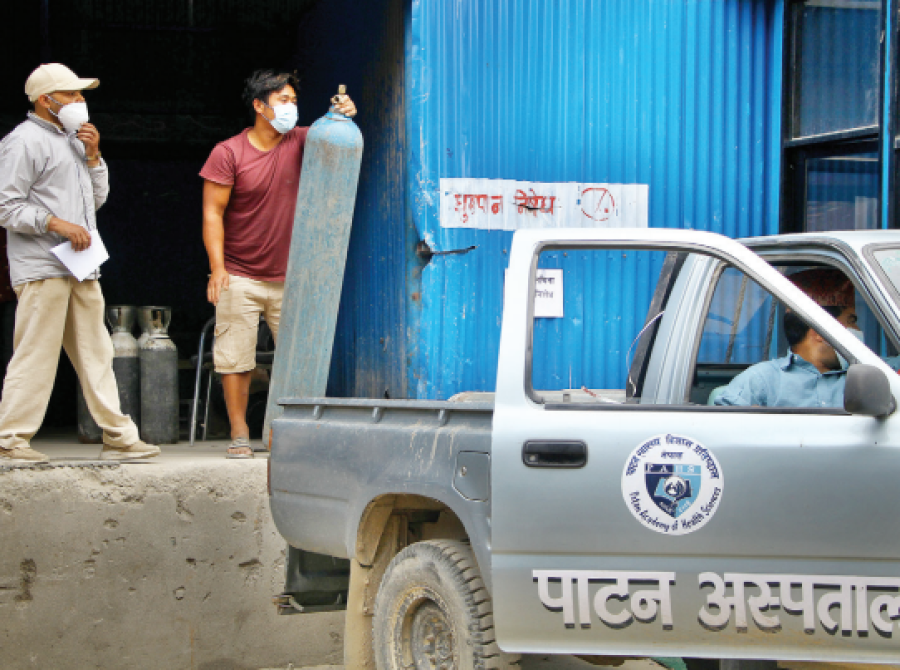Health
Hospitals say installing oxygen plants within deadline not possible
Hospitals should have their own oxygen plants to prepare for a third wave and future pandemics, experts say.
Prithvi Man Shrestha
Citing an acute shortage of oxygen, the Jorpati-based Nepal Medical College Teaching Hospital published a notice on May 11 telling its Covid-19 patients to get discharged.
The notice said the patients must leave the hospital as it would run out of oxygen by 4pm that day.
After Sopan Pharmaceuticals Limited, a private firm that supplied oxygen to the hospital, notified the hospital that its oxygen machine had broken down and it would no longer be able to supply the gas, the hospital was unable to secure oxygen from other suppliers and asked its patients to get discharged.
After this incident, the hospital is working to install its own oxygen plant.
“We have started a search for an oxygen plant supplier from countries including China, France and Germany,” said Dr Bhola Rijal, chairperson of the hospital.
The hospital is searching for a plant with a capacity of producing oxygen enough to fill 100-200 cylinders daily.
“If we are able to find an oxygen manufacturer within a few days then we will be able to install a plant within a month,” said Dr Rijal. A day after the hospital and several others published notices saying they had run out of oxygen, the government on May 12 had ordered private hospitals with 100 beds or more to set up their own oxygen plants within 15 days. Dr Rijal’s is a 130-bed hospital.
But Dr Rijal said they have decided to set up an oxygen plant not because of the government’s instruction but after realizing that big hospitals should have their oxygen plants to ensure an uninterrupted supply of the life-saving gas during a crisis like this.
Currently, a majority of private hospitals in Nepal don’t have oxygen plants and have been relying on private sector suppliers.
According to Kumar Thapa, senior vice president of the Association of Private Health Institution Nepal, there are around 300 private hospitals in Nepal and just around 20 of them have their own oxygen plants.
According to the proprietors of private hospitals, an oxygen plant was never their priority because there had never been the need. “We never discussed the oxygen plant as a part of the hospital infrastructure,” Thapa said.
But, the deadly second wave of the coronavirus pandemic exposed the vulnerability of Nepal’s hospitals. In fact, many government-run hospitals also do not have their own oxygen plants.
“Our understanding was that the oxygen plant was something related to the oxygen industry,” said Thapa.
Oxygen plants were not in the hospitals’ priority also because, until the current crisis, the demand for oxygen was low and the private sector oxygen plants that supplied to the hospitals had been operating at under capacity.
But amid the government order to set up oxygen plants within 15 days, private hospitals say the time given to them is too short and there will be huge costs involved, plus there are prohibitory orders in place, so it is not possible for them to follow the order.
“There is a lockdown and international flights have been suspended so there is no way to bring in the oxygen plants,” the association said in a press statement.
“No manufacturer in the world will supply us with an oxygen plant before at least three months after an order is placed. And after the plant arrives, it takes at least 15 days to install. Not all the hospitals are capable of buying and installing an oxygen plant because it costs around Rs25 million including the installation cost for a plant of the government’s specifications.”
However, a government official said private hospitals must bring oxygen plants. “It may take three weeks to bring the plants if not two weeks,” Jageshwar Gautam, spokesperson at the Ministry of Health and Population. “The government may think about what actions to take against the hospitals that do not make efforts to import the oxygen plants.”
But, a few hospitals have approached the Health Ministry with the intention of importing oxygen plants. “After the government’s instruction, two-three hospitals have initiated the process to bring the oxygen plants,” said Gautam.
The government has decided to waive taxes including customs duty, value added tax and excise duty for medical goods including oxygen cylinders, oxygen concentrators and oxygen plants.
Hospital proprietors like Dr Rijal say it is necessary for hospitals to have their own oxygen plants to tackle future pandemics. “If not during the second wave, having our own oxygen plants will be helpful if a third wave of the Covid-19 pandemic hits the country,” said Dr Rijal.
Dr Sharad Onta, a public health expert, agrees. “The second wave has shown us how deadly the pandemic is, so without any delay we must make preparations for a possible third wave,” said Dr Onta.




 20.81°C Kathmandu
20.81°C Kathmandu















